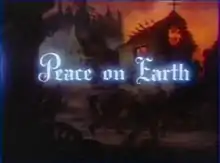| Peace on Earth | |
|---|---|
 Title card | |
| Directed by | Hugh Harman |
| Story by |
|
| Produced by |
|
| Starring |
|
| Music by | Scott Bradley |
| Animation by |
|
Production companies | |
| Distributed by | Loew's Inc. |
Release date |
|
Running time | 9 minutes |
| Country | United States |
| Language | English |
Peace on Earth is a one-reel 1939 Metro-Goldwyn-Mayer cartoon short directed by Hugh Harman, about a post-apocalyptic world populated only by animals, as it is claimed in the short that human beings have gone extinct due to war.
Plot
Two young squirrels ask their grandfather (voiced by Mel Blanc) on Christmas Eve who the "men" are in the lyric "Peace on Earth, good will to men." The grandfather squirrel then tells them a history of the human race, focusing on the never-ending wars men waged. Ultimately the wars do end, with the deaths of the last men on Earth, two soldiers shooting each other, one shoots the other soldier and the injured soldier kills the last, but slowly dies as he sinks into a watery foxhole while his hand grasps into the water. Afterwards, the surviving animals discover a copy of an implied Bible in the ruins of a church. Inspired by the book's teachings, they decide to rebuild a society dedicated to peace and nonviolence (using the helmets of the soldiers to construct houses). The short features a version of "Hark! The Herald Angels Sing" with rewritten lyrics, and a trio of carolers sing this song outside of the squirrels' house.
Accolades
According to Hugh Harman's obituary in The New York Times[2] and Ben Mankiewicz, host of Cartoon Alley, the cartoon was nominated for a Nobel Peace Prize.[3] However, it is not listed in the official Nobel Prize nomination database.[4] Mankiewicz also claimed that the cartoon was the first about a serious subject by a major studio. In 1994, it was voted #40 of the 50 Greatest Cartoons of all time by members of the animation field.[5]
It was also nominated for the 1939 Academy Award for Short Subjects (Cartoons). It did not claim that honor (which instead went to Walt Disney's Silly Symphony The Ugly Duckling).
Remake
| Good Will to Men | |
|---|---|
| Directed by | |
| Story by |
|
| Produced by |
|
| Starring | Elmore Vincent June Foray Sandy Descher Mitchell Boys Choir[6] |
| Music by | Scott Bradley |
| Animation by |
|
| Layouts by | Dick Bickenbach |
| Backgrounds by |
|
| Color process | |
| Distributed by | Metro-Goldwyn-Mayer |
Release date | December 23, 1955 |
Running time | 9 minutes |
| Country | United States |
| Language | English |
Fred Quimby, William Hanna and Joseph Barbera remade the cartoon in CinemaScope in 1955.[3] This post-World War II version of the film, entitled Good Will to Men, featured updated and even more destructive forms of warfare technology such as flamethrowers, bazookas, missiles, and nuclear weapons.[7] This version used a choir of mice as the main characters including a deacon mouse who tells the story to his charges, and also had more direct religious references (though the Bible is simply referred to as "the book of humans' rules" in both), Good Will to Men includes a reference to the New Testament, while Peace on Earth only includes verses from the Old Testament). This new version was also nominated for the Best Animated Short Subject Oscar, but lost to Speedy Gonzales. This film would be the last animated production for producer Fred Quimby before his retirement in May 1955.
Home Media
Both Peace on Earth and Good Will to Men are included, digitally restored and uncut, on the Warner Bros. Home Entertainment Academy Awards Animation Collection DVD set. Peace on Earth is also included as an extra on The Mortal Storm Blu-Ray by Warner Archive Collection.
See also
References
- ↑ Scott, Keith (October 3, 2022). Cartoon Voices of the Golden Age, Vol. 2. BearManor Media. p. 110. Retrieved October 2, 2022.
- ↑ "Hugh Harman, 79, Creator Of 'Looney Tunes' Cartoons". New York Times. November 30, 1982.
- 1 2 Barbera, Joseph (1994). My Life in "Toons": From Flatbush to Bedrock in Under a Century. Atlanta, GA: Turner Publishing. pp. 72–73. ISBN 978-1-57036-042-8.
- ↑ "The Nomination Database for the Nobel Peace Prize, 1901–1955". nobelprize.org.
- ↑ Beck, Jerry (1994). The 50 Greatest Cartoons: As Selected by 1,000 Animation Professionals. Turner Publishing. ISBN 978-1878685490.
- ↑ Scott, Keith (October 3, 2022). Cartoon Voices of the Golden Age, Vol. 2. BearManor Media. p. 129. Retrieved October 2, 2022.
- ↑ Crump, William D. (2019). Happy Holidays—Animated! A Worldwide Encyclopedia of Christmas, Hanukkah, Kwanzaa and New Year's Cartoons on Television and Film. McFarland & Co. p. 121. ISBN 9781476672939.
External links
- Peace on Earth at IMDb
- Peace on Earth at the TCM Movie Database
- Good Will to Men at IMDb
- Good Will to Men at the TCM Movie Database
- The short film Peace On Earth (1939) is available for free viewing and download at the Internet Archive.